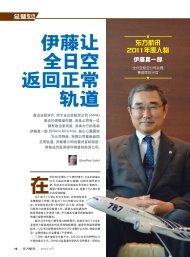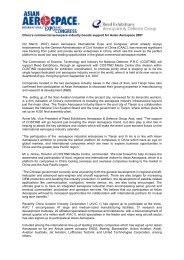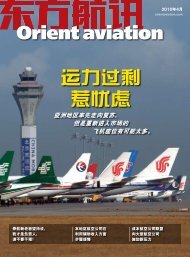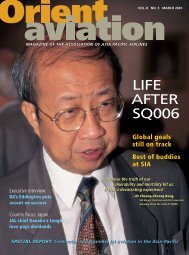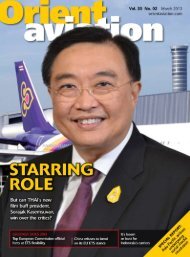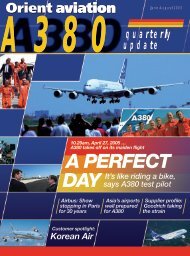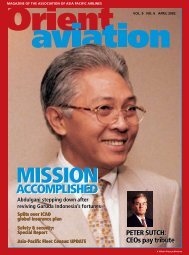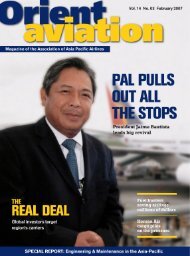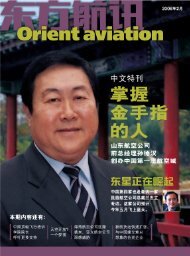You also want an ePaper? Increase the reach of your titles
YUMPU automatically turns print PDFs into web optimized ePapers that Google loves.
49TH ASSEMBLY OF PRESIDENTS<br />
The Asia-Pacific’s legacy<br />
airlines have warned airport<br />
authorities around the region<br />
not to attempt to subsidize<br />
new low-cost airline (LCC)<br />
terminals by raising charges on existing full<br />
service carriers.<br />
The growth in the budget airline sector<br />
has added a “new twist” to the charging<br />
scenario, the Association of Asia Pacific<br />
Airlines (AAPA) said in its annual report.<br />
“To compete with other hubs in the<br />
region, airports are being tempted to grant<br />
special concessions or incentives to lure<br />
these new entrants to use their facilities. In<br />
some countries, including Singapore and<br />
Malaysia, airports are building dedicated<br />
‘low-cost’ terminals to cater specifically<br />
to the needs of such LCCs, in other words,<br />
to provide maximum operational flexibility<br />
while minimizing costs for the airlines and<br />
passengers using these facilities,” said the<br />
report.<br />
This only begs the question of why<br />
airports are not providing the same choice<br />
of cost-effective services to their existing<br />
airline customers, it added. “Other relevant<br />
questions raised include: Will the financing of<br />
such LCC terminals be passed on to existing<br />
airport users in the form of further increases<br />
in charges and fees Are airport incentives<br />
effectively disguised subsidies for one group<br />
of users at the expense of another<br />
“All airlines should have the choice to use<br />
whatever facilities are on offer and the pricing<br />
of services must be transparent, fair and based<br />
on equitable principles.<br />
“We will continue to press for greater<br />
transparency in pricing regimes, as well as<br />
oppose any attempts by airports to crosssubsidize<br />
new entrants,” said the report.<br />
According to the AAPA, all too often<br />
aviation is misconstrued as being under-taxed<br />
as an industry. “Even now, with close to two<br />
billion passengers flying safely each year,<br />
some still view air transportation as a kind<br />
of luxury good rather than an essential public<br />
service. Calls for new and higher taxes to be<br />
imposed on airlines ignore these realities,<br />
preferring instead to attack aviation as a<br />
candidate for ‘sin taxes’ of the kind commonly<br />
imposed on alcohol and tobacco,” it said.<br />
The AAPA pointed out the aviation<br />
industry is subjected to a variety of very<br />
substantial corporate and local taxes. In the<br />
U.S., both airlines and passengers are liable<br />
for up to 13 major taxes and fees, contributing<br />
over 13% of federal tax revenue.<br />
It slammed proposals raised at this year’s<br />
Airports warned not to<br />
subsidize LCC terminals<br />
at expense of airlines<br />
Asia-Pacific’s LCC pioneer AirAsia<br />
World Economic Forum for a mandatory<br />
levy on airline tickets and jet fuel to help poor<br />
nations in Africa. While the fuel tax proposal<br />
was swiftly rejected, the possibility of<br />
imposing an airline ticket tax remained open<br />
for deliberation, with France in particular<br />
leading a call for worldwide support and<br />
implementation of the proposal.<br />
“While no one denies the need to find<br />
solutions to eradicate poverty and tackle<br />
global health issues, the choice of the aviation<br />
industry as a target to raise funds for such<br />
laudable efforts is sadly misdirected,” said<br />
the AAPA annual report.<br />
‘ Budget airline sector has added<br />
a “new twist” to the airport<br />
user charges scenario’<br />
Association of Asia Pacific Airlines<br />
“A ticket levy is a misguided and counter<br />
productive approach. It would only serve<br />
to reduce demand for travel and tourism<br />
– which are themselves key drivers of<br />
economic development for many poorer<br />
countries.”<br />
Complaining that many governments<br />
seem to view airlines as “cash cows”, the<br />
report said one example was a move earlier<br />
this year by Indonesian authorities to impose<br />
a tax on the uplift of jet fuel for international<br />
flights from that country.<br />
“The AAPA joined other industry<br />
stakeholders in writing to the Indonesian<br />
Government questioning the legality of such<br />
a move and highlighting the potential damage<br />
to the travel and tourism sector and broader<br />
local economy that would result. Fortunately,<br />
the proposal was subsequently withdrawn by<br />
the Indonesian authorities,” said the report.<br />
Airlines are having to cope with an<br />
“onslaught of charges” imposed by monopoly<br />
or quasi monopoly providers, such as<br />
airports, added the AAPA.<br />
“Much of this comes about as some<br />
governments invest heavily in airport infrastructure<br />
in a bid to enhance their position<br />
as air transport hubs within the region,” said<br />
the report.<br />
“But monumental terminal buildings<br />
require extremely high levels of capital<br />
investment and are expensive to run and<br />
maintain.<br />
“Inevitably this leads to conflicts when<br />
such excessive costs result in increased<br />
airport charges to be borne by airlines,<br />
passengers and other airport users.<br />
“In today’s environment where airlines<br />
are fighting for their survival by battling<br />
falling yields and margins, facing increasing<br />
regulatory challenges and mounting costs,<br />
increases in airport charges can only be<br />
considered in relation to real improvements<br />
in service quality and efficiency.<br />
“Unfortunately, the fact that many<br />
airports are effectively monopolies reduces<br />
any commercial pressure to implement such<br />
improvements.”<br />
18 ORIENT AVIATION DECEMBER 2005-JANUARY 2006


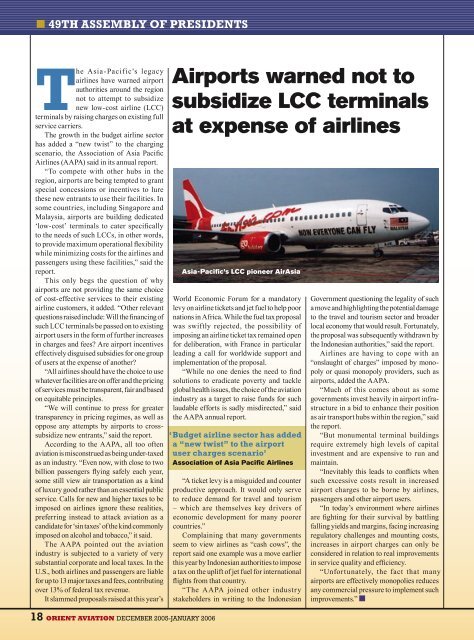
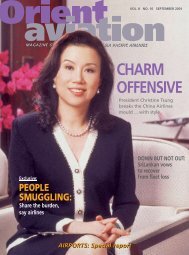
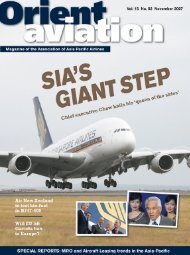
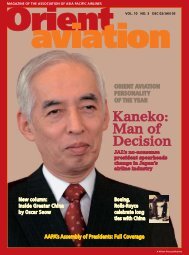
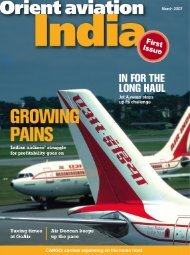
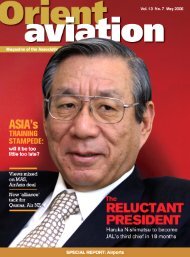
![OAMag-V7N4-Cover [Converted] - Orient Aviation](https://img.yumpu.com/48598575/1/190x255/oamag-v7n4-cover-converted-orient-aviation.jpg?quality=85)
